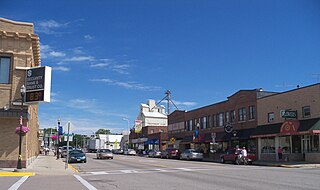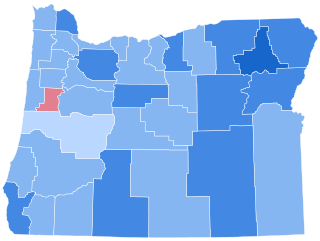External links
| |||||||||||
| |||||||||||
| | This Oregon government-related article is a stub. You can help Wikipedia by expanding it. |
Justice courts are state courts of law in Oregon. [1] [2] While the Justice Court is a kind of state court, and the Justice of the Peace is an Oregon State Court judge, the Justice Courts are financed and authorized by their respective counties. [1] Because Justice Courts are financed by the counties, they are not part of the Oregon Judicial Department. [3]
Justice Courts have been part of Oregon's legal framework since before Oregon was a territory. [1] In Oregon, Justice Courts have jurisdiction over civil lawsuits of less than $10,000; [4] evictions; [5] misdemeanors, [6] and violations, [6] like traffic tickets, boating violations, and wildlife violations. Further, Justice Courts have jurisdiction over violations of the county code, and some Justice Courts act as the municipal court of certain cities. [7] Justice courts do not have jurisdiction over certain types of civil cases, including disputes over title to real estate, false imprisonment, libel, slander, and malicious prosecution. [8] Justices of the Peace are authorized to perform courthouse weddings in Oregon. [9]
Justice Courts can empanel juries, but most matters in Justice Court are tried to the bench, where the Justice is the factfinder. [1] No Justice Court is currently a court of record, so appeals run through the Circuit Court. [1]
The Judge at a Justice Court is called the Justice of the Peace. [1] A Justice of the Peace is elected for a term of six years. [10] If a Justice of the Peace position becomes vacant during the Justice's term, the Governor appoints a Justice to fill the vacancy until the next general election. [11]
Justice Courts are smaller than circuit courts, so many customers find them easier to navigate. [1] Further, the filing fees in Justice Court are often cheaper than the filing fees in Circuit Court. [12] [13] Most cases in Justice Court are either pro se (no lawyers) or half-se (only one side represented by lawyers) so Justice Courts are accustomed to working with self-represented litigants. [1]
As of 2023, there are 22 justice courts in the following counties: Baker, [14] Clackamas, [15] Columbia, [16] Deschutes, [17] Douglas (Canyonville), [18] Douglas (Reedsport), [18] Gilliam, [19] Grant, [20] Harney, [21] Hood River, [22] Jackson, [23] Klamath, [24] Lane, [25] Linn, [26] Malheur, [27] Marion, [28] Morrow, [29] Sherman, [30] Tillamook, [31] Union, [32] Washington, [33] and Wheeler. [34]
{{cite web}}: Missing or empty |title= (help){{cite web}}: Missing or empty |title= (help){{cite web}}: Missing or empty |title= (help){{cite web}}: Missing or empty |title= (help){{cite web}}: Missing or empty |title= (help){{cite web}}: Missing or empty |title= (help){{cite web}}: Missing or empty |title= (help){{cite web}}: Missing or empty |title= (help){{cite web}}: Missing or empty |title= (help){{cite web}}: Missing or empty |title= (help){{cite web}}: Missing or empty |title= (help){{cite web}}: Missing or empty |title= (help){{cite web}}: Missing or empty |title= (help){{cite web}}: Missing or empty |title= (help){{cite web}}: Missing or empty |title= (help){{cite web}}: Missing or empty |title= (help){{cite web}}: Missing or empty |title= (help){{cite web}}: Missing or empty |title= (help){{cite web}}: Missing or empty |title= (help){{cite web}}: Missing or empty |title= (help){{cite web}}: Missing or empty |title= (help)
Mendota Heights is a city in Dakota County, Minnesota, United States. It is a first ring southern suburb of the Twin Cities. The population was 11,744 at the 2020 census.

Glencoe is a city and the county seat of McLeod County, Minnesota, United States. The population was 5,631 at the 2010 census.

A justice of the peace (JP) is a judicial officer of a lower or puisne court, elected or appointed by means of a commission to keep the peace. In past centuries the term commissioner of the peace was often used with the same meaning. Depending on the jurisdiction, such justices dispense summary justice or merely deal with local administrative applications in common law jurisdictions. Justices of the peace are appointed or elected from the citizens of the jurisdiction in which they serve, and are usually not required to have any formal legal education in order to qualify for the office. Some jurisdictions have varying forms of training for JPs.

The United States District Court for the District of Oregon is the federal district court whose jurisdiction comprises the state of Oregon. It was created in 1859 when the state was admitted to the Union. Appellate jurisdiction belongs to the United States Court of Appeals for the Ninth Circuit. Matthew P. Deady served as its first judge. Marco A. Hernandez is the current chief judge.

Clackamas High School (CHS) is a public high school located in Clackamas, Oregon, United States. The school itself was built in 2002, replacing an older, smaller building built in 1957 which is now Alder Creek Middle School. Starting in the 2010–2011 school year, the campus included the former building of Sunrise Middle School. During the 2021-2022 school year, the East Campus building turned into Rock Creek Middle School.

The Confederated Tribes of the Grand Ronde Community of Oregon (CTGR) consists of twenty-seven Native American tribes with long historical ties to present-day western Oregon between the western boundary of the Oregon Coast and the eastern boundary of the Cascade Range, and the northern boundary of southwestern Washington and the southern boundary of northern California. The community has an 11,288-acre (45.7 km2) Indian reservation, the Grand Ronde Indian Reservation, which was established in 1856 in Yamhill and Polk counties.
Brentwood-Darlington is a neighborhood on the southern edge of Portland, Oregon, bordering SE 45th Avenue to the west, SE Duke Street to the north, and SE 82nd Avenue to the east. The county line separating Multnomah County from Clackamas County forms most of the neighborhood's southern boundary, though small portions of the neighborhood and the city extend into Clackamas County. Roughly, the southern boundary is SE Harney Drive on the eastern one-fourth, and SE Clatsop Street on the other three-quarters.

The Libertarian Party of Oregon is a political party representing the national Libertarian Party in the U.S. state of Oregon. It is organized as a minor party for state election law, and recognized by the Oregon as a statewide nominating party.

Oregon Route 216 is an Oregon state highway running from U.S. Route 26 at Warm Springs Junction to U.S. Route 97 in Grass Valley. OR 216 is 61.30 miles (98.65 km) long and runs east–west.
Oregon's circuit courts are general jurisdiction trial courts of the U.S. state of Oregon. These courts hear civil and criminal court cases.
Louis F. O’Neill is an American diplomat and attorney. An expert on Russia/Eurasia conflicts and security, he served as Organization for Security and Co-operation in Europe Ambassador and Head of Mission to Moldova (2006–2008). O’Neill worked on the State Department's Policy Planning Staff (2005–2006), and as Special Assistant for Russian Affairs to Secretary of State Colin Powell (2004–2005) when O’Neill was a non-political, non-partisan White House Fellow.

Oregon Ballot Measure 57 (2008) or Senate Bill (SB) 1087 was a legislatively referred state statute that increased term of imprisonment for persons convicted of specified drug and property crimes under certain circumstances. The measure enacted law which prohibits courts from imposing less than a presumptive sentence for persons convicted of specified drug and property crimes under certain circumstances, and requires the Department of Corrections to provide treatment to certain offenders and to administer grant program to provide supplemental funding to local governments for certain purposes.

Litter in the United States is an environmental issue and littering is often a criminal offense, punishable with a fine as set out by statutes in many places. Litter laws, enforcement efforts, and court prosecutions are used to help curtail littering. All three are part of a "comprehensive response to environmental violators", write Epstein and Hammett, researchers for the United States Department of Justice. Littering and dumping laws, found in all fifty United States, appear to take precedence over municipal ordinances in controlling violations and act as public safety, not aesthetic measures. Similar from state-to-state, these laws define who violators are, the type or "function" of the person committing the action, and what items must be littered or dumped to constitute an illegal act. Municipal ordinances and state statutes require a "human action" in committing illegal littering or dumping, for one to be "held in violation." Most states require law enforcement officers or designated, authorized individuals, to "...witness the illegal act to write a citation." Together, prosecutions and punitive fines are important in fighting illegal littering and dumping.

The following outline is provided as an overview of and topical guide to the U.S. state of Oregon:

Horizon Christian School is a private Christian school located in Hood River, Oregon, United States.

The Guardia di Finanza is an Italian law enforcement agency under the authority of the Minister of Economy and Finance. It is a militarized police force, forming a part of the Ministry of Economy and Finance, not the Ministry of Defence. Guardia di Finanza is essentially responsible for dealing with financial crime and smuggling; it has also evolved into Italy's primary agency for suppressing the illegal drug trade. It maintains over 600 boats and ships and more than 100 aircraft to serve in its mission of patrolling Italy's territorial waters. It also has the role of border police and customs duties at Italian airports.
Jonathan E. Malaya is a Filipino writer, author, businessman, and public official who is currently the Assistant Director General of the National Security Council. As an additional, he also manage PDP Laban Federalism Institute, as its Executive Director, the institute is a political think tank established by Senate President Koko Pimentel. He is also a member of the Technical Working Group advising the House of Representatives on proposed amendments to the Constitution. In the past he also served as Assistant Secretary in the Office of the President of the Philippines, and Assistant Secretary for Special Projects and Legislative Liaison in the Department of Education of the Philippines.

The 1932 United States presidential election in Oregon took place on November 8, 1932, as part of the 1932 United States presidential election. Voters chose five representatives, or electors, to the Electoral College, who voted for president and vice president.